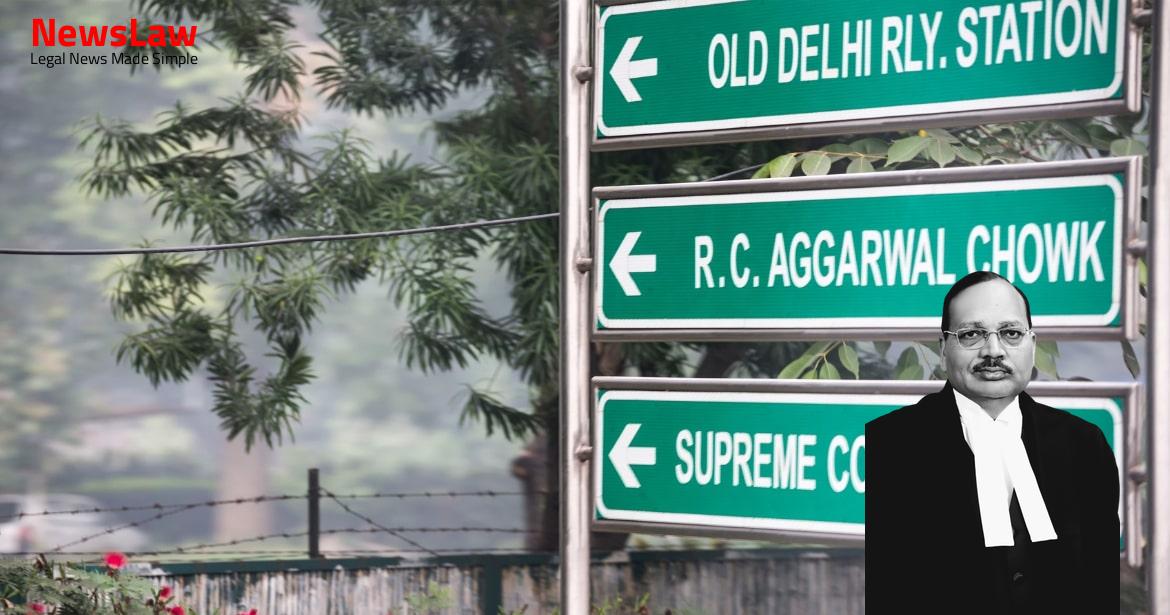The court’s thorough analysis of Section 13 in eviction proceedings sheds light on crucial aspects of tenant rights, rent payments, and protection against eviction. This legal interpretation provides clarity on the obligations and rights of tenants and landlords in such cases, highlighting the importance of compliance with statutory provisions and court directives. Stay tuned to learn more about the intricate legal framework surrounding eviction proceedings and the application of relevant laws for both parties involved.
Facts
- The respondent sought a decree for mesne profit in addition to eviction.
- Rent Control Authority submitted a report without giving the appellant an opportunity, relying on a Panchnama.
- An interim order was made absolute.
- Appellant was directed to pay mesne profit of Rs. 18,000/- per month.
- Appellant filed a Second Appeal on 12.06.2014.
- Common questions were raised in both appeals.
- First Appeal by the appellant was dismissed on 25.03.2014.
- Respondent filed a suit under Section 12 (1) (a), (c), (f) and (h) of the Madhya Pradesh Accommodation Control Act, 1961.
- An interim order against eviction was passed.
- Rent Control Authority directed to submit a report on prevailing market rate.
- Second Appeal was admitted on 16.09.2016.
- Appellant was a tenant of a non-residential accommodation for a monthly rent in the year 1975.
- Appellants were directed to pay arrears of rent within 2 months.
- The High Court allowed the application filed by the appellants under Order XLI Rule 5 of the Code of Civil Procedure.
- Applications for a direction to pay mesne profits, monthly rent, and damages were also granted to the respondent.
- Appellants were directed to pay rent for the suit shops at the rate of Rs.18000 per month to the respondent.
- This payment was to be made from the date of the decree passed by the lower Appellate Court until the disposal of the Second Appeals.
Also Read: Judicial Analysis on Back Wages in Employee Caste Verification Case
Arguments
- Shri Amit Sahni argues that a proper interpretation of Section 13 of the Act and related provisions leads to the inevitable conclusion that the impugned order was justified.
Also Read: Interpretation of Suspension Rules in Employment Case
Analysis
- Section 13 of the Act requires the tenant to deposit or pay an amount representing rent within one month of the service of writ of summons in case of eviction proceedings initiated by the landlord.
- The tenant is protected even during appeal proceedings against eviction as long as he deposited the rent agreed upon.
- If there is a dispute on the amount of rent payable by the tenant, the court can fix a reasonable provisional rent to be deposited or paid until the decision of the suit or appeal.
- Failure to deposit or pay the required amount as per Section 13 may result in the court striking out the defense against eviction and proceeding with the hearing of the suit.
- The tenant must continue to deposit or pay the rent on a monthly basis till the decision of the suit, appeal, or proceeding.
- The provision indicates that despite payment being made by the tenant, an order of stay of eviction may still be necessary as per Section 23F.
- The tenant can avail protection against eviction on the ground of rent default if arrears are cleared within the specified period in Section 13.
- The legislative history shows the application of Sections 13(1) and 13(2) in any appeal or proceeding against an eviction order based on Section 12 grounds.
- The words ‘any of the grounds’ in Section 13 are applicable not only to suits initiated by landlords but also to appeals or other proceedings against eviction decrees.
- The tenant’s right to protection against eviction due to rent arrears under Section 13 is limited to once per accommodation, and repeated defaults may lead to loss of this protection.
- Stay of execution of decrees in appeals or revisions cannot be asked for as of right.
- Section 13 applies even if the ground of eviction is not under Section 12(1)(a).
- In an appeal by the tenant against an eviction order, the appellate court can impose conditions other than deposit of rent.
- The definition of a tenant under the Act is crucial, and certain rights are retained even after the termination of the tenancy.
- The court can direct the appellant tenant to compensate the landlord with a reasonable amount, not necessarily the same as the contractual rent.
- Important contextual and statutory constructions have been highlighted in various cases to interpret Section 13.
- The legislation amended Section 13 in 1983 based on judicial decisions to provide clarity.
- The doctrine of merger does not impact the termination date of tenancy due to eviction decrees being merged in superior court decrees.
- The purpose of Section 13 is to deter tenants from prolonging litigation without paying rent.
- Time must be granted to deposit the amount.
- Court may direct payment to the landlord during the pending matter if it is just and expedient.
- If final decision favors the tenant, payment should be made to the tenant without delay or complications.
- Direction to pay the entire amount may require modification in this case.
Also Read: Legal Analysis of Assignment and Ratification in Property Law
Decision
- Respondent allowed to withdraw rent at Rs.10,000 per month from deposited amount
- Respondent permitted to withdraw Rs.10,000 per month from amount to be deposited by appellants
- Appellants granted five weeks to deposit entire amount after adjusting amounts already paid
- Amounts paid under Section 13 of the Act to be subsumed
- First Appellate Court dismissed appeal, deposited amount to be paid after final disposal
Case Title: HEERA TRADERS Vs. KAMLA JAIN (2022 INSC 219)
Case Number: C.A. No.-005996-005997 / 2021



